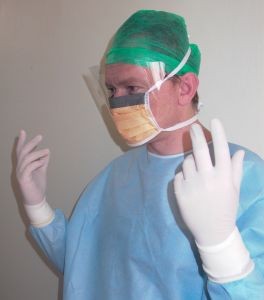When you go into a hospital on the day of your surgery, you have likely met with your surgeon and discussed the risk and benefits of the benefits of whatever procedure you are scheduled to have that day, assuming you are not brought into the emergency room and rushed into an operating room. You are likely confident that surgeon has the skill and experience to do his or her job properly, and while this is very likely true, if your surgeon is unknowingly using a defectively-designed medical device, the chance of a complication may be exceedingly high.
 In a case from the Washington State Supreme Court, a surgeon who had used a defendant’s surgical assist robot on numerous occasions spoke to the patient about his intention to use the relatively new device to operate on the patient’s prostate cancer. The doctor obtained informed consent from the patient, who was considered severely obese at the time of his surgery.
In a case from the Washington State Supreme Court, a surgeon who had used a defendant’s surgical assist robot on numerous occasions spoke to the patient about his intention to use the relatively new device to operate on the patient’s prostate cancer. The doctor obtained informed consent from the patient, who was considered severely obese at the time of his surgery.
According to court records, it is against the manufacturer’s warning to surgeons to use the device on a patient with a body mass index (BMI) as high as this particular patient. It was also against their advice to perform the surgery on someone who had already had abdominal surgery in the past. In this case, plaintiff had already undergone three previous procedures involving surgery to his abdomen. As a result of the patient’s weight, the surgeon could not place him in what is known as the steep Trendelenburg position during surgery, as was also recommended by the manufacture.
When the plaintiff underwent surgery, the device resulted in a tear of his rectum that caused severe complications. He needed several more surgical procedures, and his quality of life was never the same following this surgery.
The doctor testified that he was aware plaintiff was not an ideal candidate for this procedure, but he decided to do the procedure anyway. This case however, does not deal with the surgeon’s liability, as that was likely another matter. In this case, the issue was that the hospital purchased the device and credentialed two doctors to use the device. The company representatives trained these doctors, and they were told of the risks and procedures, but the hospital was never told of them. Hospital administrators argued that, had they been aware of the risks, they would not have allowed this operation using the robot.
The defendant argued that it had no duty to warn the hospital of the known dangers, since it did warn the doctors who would be performing surgery. However, the court ruled that the medical device manufacturer did have a duty to warn the purchasing hospital, stemming from its duty of due care owed to the plaintiff.
While this should have solved the problem, the trial court did not instruct the jury that the manufacturer had such a duty as a matter of law. The jury found the defendant not liable, because the members assumed that telling the surgeons was sufficient. The supreme court overruled this verdict, finding the trial court had erred as a matter of law. As our Boston products liability attorneys can explain, jury instructions are often a crucial part of a trial, as the jury must know what the relevant law is regarding the verdict they have been asked to render.
Call the Boston Jeffrey Glassman Injury Lawyers for a free and confidential appointment — (617) 777-7777.
Additional Resources:
Taylor v. Intuitive Surgical Inc., February 8, 2017, Supreme Court of Washington State
More Blog Entries:
FDA Announces Testosterone Meds Must Carry Broader Warning, July 7, 2014, Boston Products Liability Lawyers Blog
 Product Liability Lawyer Blog
Product Liability Lawyer Blog

